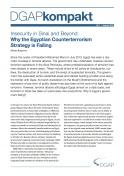In the past two years, the Sinai-Peninsula-based militant group Wilayat Sinai (Sinai Province of the Islamic State, previously known as Ansar Bayt al-Maqdis, or ABM) has killed or injured hundreds of Egyptian security officials and civilians. These Islamic militants form by far the most active and dangerous armed group in Egypt. In 2015 alone, Wilayat Sinai (WS) has claimed responsibility for numerous attacks on security facilities and checkpoints in northern Sinai; the successful missile attack on an Egyptian navy patrol boat in July; the kidnapping and beheading of a Croatian worker; and, most recently, the bombing in October of a Russian charter airplane. Despite the government’s ongoing counterterrorism campaign, ABM/WS has been able to maintain its stronghold in the northern Sinai and further expand its operational capacities.
ABM/WS is a relatively new player to the Egyptian scene of politically motivated violence. The group emerged as Ansar Bayt al-Maqdis (ABM) in the northern parts of Sinai shortly after the 2011 revolution and has integrated large numbers of residents of the peninsula’s Northern Governorate, appealing in particular to members of local Bedouins clans. One reason for its success attracting local residents into its ranks was its ability to capitalize on widespread bitterness in the local population, which has experienced decades of economic neglect and state oppression. In addition to attacks on military and police targets, which seemed to be driven primarily by vengeance, the group initially focused on Israeli targets. As its original name indicated, ABM’s stated objective was the liberation of historical Palestine. To this end it launched several cross-border attacks and sabotaged the Egypt-Israeli gas pipeline several times. At the outset, AMB associated itself ideologically with Al Qaeda’s jihadist ideology and hailed such Al Qaeda “icons” as Osama bin Laden and Abu Musab al-Zarqawi.
Morsi’s Ouster Provided New Impetus to Terrorism in Sinai
The ouster of Mohamed Morsi and the subsequent bloody dispersal of pro-Morsi sit-ins in Cairo in the summer of 2013, which left “at least 817 and likely more than 1,000” protesters dead, gave new direction to ABM. Although the group claimed it despised the Muslim Brotherhood (MB) for participating in “the political game,” ABM sought to take advantage of the massive government crackdown on the MB and its supporters in order to present itself as the defender of Muslims, and cited the crackdown as grounds for deliberately targeting the state. Subsequently, ABM increasingly and vehemently started to attack targets connected to the government. Whereas the bulk of attacks were concentrated in northern Sinai, ABM also undertook attacks in the Egyptian mainland. Among others, it targeted security headquarters in Mansoura. The geographical expansion of its attacks to the mainland was built on the clandestine network of ABM operatives in the Nile Delta who had been actively recruited in the past years, and proved the emergence of an additional ABM stronghold outside Sinai.
In November 2014, after months of heavy attacks against Egyptian security forces, ABM entered a new phase. It pledged allegiance (bayat) to the Islamic State (IS), changed its name to Wilayat Sinai (WS, The Province of Sinai), and adopted a media strategy that closely followed IS, including publishing videos of executions. The declaration of allegiance to IS created an internal ideological rift between Al Qaeda loyalists and supporters of IS, however, which weakened the group’s internal structure and operational capacities in the early winter of 2014–15. Yet, as the developments of the past months have shown, ABM/WS has consolidated its position by taking on leadership of IS supporters. It has turned to more ruthless and IS-like tactics including attacks on civilians. Among others, civilian Sinai residents are increasingly being targeted for allegedly collaborating with the Egyptian military. Even though ABM/WS might initially not have identified with the global goals of IS, its claim of responsibility for the October 2015 bomb attack on the Russian charter plane indicates that its aim of undermining the Egyptian government is compatible with IS’s objectives; ABM/WS, too, is willing to attack nationals of those countries, like Russia, that are fighting IS in Syria and Iraq.
The emergence of ABM and its further radicalization as WS, a stated affiliate of IS, have posed an enormous challenge to the Egyptian government’s counterterrorism efforts. Certainly, these efforts have fallen short of containing the militant uprising in the Sinai Peninsula. This essay examines the reasons behind the failure of the Egyptian counterterrorism campaign in the Sinai Peninsula.

